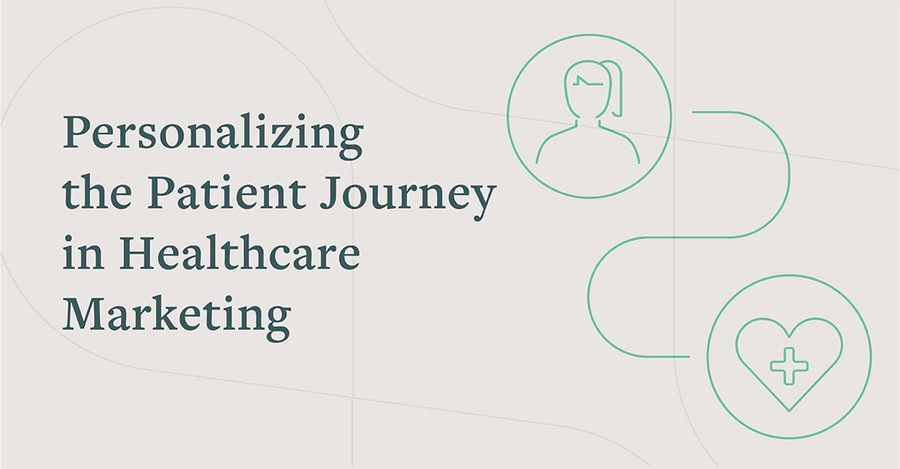Personalizing the Patient Journey in Healthcare Marketing


by
Bob Waddell
January 31, 2024
In order to vie for consumers’ attention in today's highly competitive world, healthcare marketers must stop relying on a one-size-fits-all approach and begin embracing personalization (spoiler alert: you can’t do it with digital cookies anymore).
Personalization is a powerful way to build meaningful relationships by catering to consumers’ unique needs and preferences in hopes of converting them to patients.
Understanding Patient Personas
The first step is to understand the patients' personas. A persona represents the ideal patient for the healthcare provider, and it includes demographic information, psychographic information, and behavioral data.
For example, healthcare networks can use MD MatchUp on their website to curate this first-party data from consumers in exchange for matching them up with compatible providers and content that speaks directly to the consumer’s needs and preferences. This tailored marketing approach truly reaches the right people with the right message at the right time.
Mapping the Patient Journey
The next step in personalizing the patient journey is to map it. There are several touchpoints in the patient journey, such as the provider search, scheduling an appointment, waiting room experience, consultation with the healthcare provider, diagnosis, treatment, and follow-up care. By understanding the patients' needs and preferences upfront, healthcare networks can create a personalized experience that caters to patients' unique needs and preferences.
Advanced Personalization Strategies for Healthcare Marketing
There are several advanced personalization strategies that healthcare marketers can use to personalize the patient journey. One of these strategies is to create personalized emails and social media messages. These messages are tailored to the patients' needs and personality, such as their preferences, preferred communication style, and personal interests.
Interactive content is another advanced personalization strategy that healthcare providers can use to engage patients. Interactive content includes quizzes, surveys, and assessments that provide personalized recommendations based on the patients' answers.
MD MatchUp uses a short, interactive Patient Personality Quiz to help consumers identify their patient persona and get a list of their best matching providers to select from.
Measuring the Success of Personalization Efforts
Technology plays a crucial role in personalizing the patient journey. Healthcare marketers can leverage technology to collect and analyze data on patients' needs and preferences, which can help them create targeted campaigns that speak directly to the audience.
Healthcare marketers can use metrics such as engagement rates, consumer-to-patient conversion rates, and ROI to measure success.
MD MatchUp offers health systems a Marketing Intelligence Center as part of its platform that allows marketers to access first-party data spanning everything from visibility into the consumers searching for providers on their website, market trends based on exclusive consumer and provider data, and an ROI tied directly to new and retained patient appointments.
Overcoming Barriers to Personalization in Healthcare Marketing
There can be several barriers to personalization in healthcare marketing, such as privacy concerns, data security, and regulatory compliance. Healthcare providers can overcome these barriers by implementing data security measures, such as encryption and access controls, and complying with regulatory requirements, such as HIPAA.
Another barrier to personalization in healthcare marketing is the lack of resources, such as time and budget. Healthcare providers can overcome this barrier by prioritizing personalization efforts, such as focusing on high-value patients or using automation tools to streamline processes.
The key to all of this is finding the right vendor partners who are willing and able to take on the responsibility of being HIPAA compliant, signing a BAA, and having the right knowledge and technology in place to earn and keep your trust.
MD MatchUp has a successful track record of working with the Marketing, IT, and Legal teams at health systems to meet compliance needs and accomplish patient personalization goals.
Closing Thoughts
Personalization is the key to attracting consumers and converting them to patients. Understanding patient personas, mapping the patient journey, and using advanced personalization strategies can be the building blocks to a better marketing strategy.
Healthcare marketers can leverage advanced technology, like MD MatchUp to collect and analyze data on patients' needs and preferences and measure the success of those personalization efforts.
By implementing these strategies, healthcare marketers will earn accolades for helping build meaningful relationships with patients, driving better outcomes, and improving the bottom line.